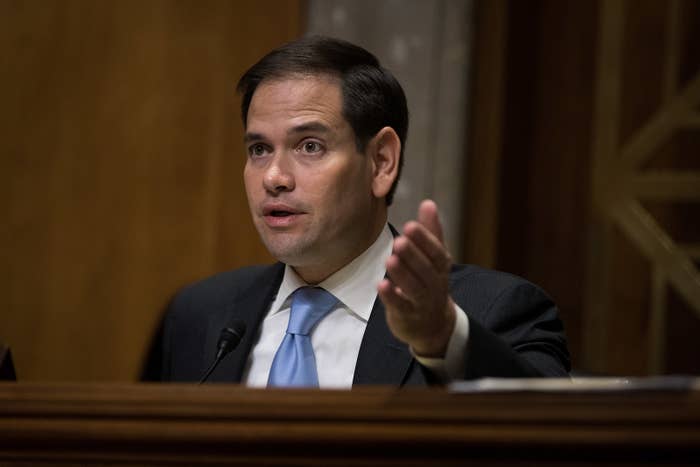
WASHINGTON — Senate Republicans in tough re-election races across the country have been touting their work this year on fighting the opioid and prescription drug crisis — a key part of their playbook for distancing themselves from Donald Trump.
Sens. Rob Portman of Ohio, Kelly Ayotte of New Hampshire, and Pat Toomey of Pennsylvania are now highlighting their vote on Comprehensive Addiction and Recovery Act (CARA) in ads and on the campaign trail as they seek to localize their race in an election year where the party's standard bearer could cost them their seats in swing states.
"Working together with Democrats and Republicans, I passed legislation to help break the grip of addiction," Portman said in his first TV ad of the year. "By investing in prevention, treatment, and recovery, empowering law enforcement and stopping the over-prescribing of painkillers, we can turn the tide."
Toomey, too, touted his efforts in ad in which mental health care provider says: “Pat Toomey’s commitment to this issue isn’t just impressive. It’s saving lives.”
The same might be expected from Sen. Marco Rubio — who announced Wednesday that he will run for re-election in a state that's often called the "pill mill capital" — but there’s one problem: He didn’t actually vote on the bill because of his presidential campaign.
Although he co-sponsored the bill, already, Democrats are attacking him in a web video for his absence in the Senate. “Marco Rubio failed to show up for work,” the text in the recently release video reads with news clips that go through the senator’s missed votes.
And, in Florida, some say there’s more to his record on prescription drug legislation that doesn’t quite fit the current trend toward robust legislation to restrict illegal access to prescription drugs and to increase addiction treatment. When he was a member of the state House, Rubio was accused of killing a bill pushed by then-Gov. Jeb Bush that would have created a prescription-drug monitoring program, according to news reports from the time and interviews with those involved. Those close to the senator say the failure of the bill in the state House was more tied to privacy concerns, not politics.
"The failure of this bill was my biggest disappointment in the legislature," said then-state Sen. Locke Burt, a Republican who sponsored the legislation, in an interview. "It caused more deaths than the wars in Iraq and Afghanistan."
"I got it out of the Senate four different times. Rubio in my view had a major role in killing it."
Headlines from Palm Beach Post, Tampa Tribune, and Miami Herald all tied the death of the bill on political retribution against Burt over an unrelated bill that sought to change the structure of the Miami-Dade County government. "Death Of Drug Bill Blamed On Revenge," one of the headlines reads, saying Rubio, along with other lawmakers from Southern Florida, took action on the prescription drug bill based on votes on the Miami-Dade bill.
Rubio, according to the Miami Herald, had been deciding whether to offer the amendment that would sink the bill and said at the time: "‘When I found out [Burt] broke his word, it made the choice easy."
In the interview with BuzzFeed News, Burt, who is now in the insurance business, said Rubio and other lawmakers were putting pressure on him to vote in favor of the Miami-Dade deal. "They thought I had committed and then reneged on it."
When asked directly if Rubio had sunk the bill over political retribution, Burt responded, "Yeah, I mean he said what he said," referring to Rubio's quotes in the press at the time. "I don't think you should hold the state of Florida hostage for a change in the charter of Miami-Dade."
A Senate aide to Rubio said that “the notion that political retribution 14 years ago is what sank this bill might seem intriguing to some today, but it’s an excuse that has not stood the test of time given that, year after year, this proposal failed because of legitimate privacy concerns.”
The bill in the Florida legislature eventually passed in 2009 after Rubio left the state legislature.
“In 2002, the Senate’s take-it-or-leave-it approach also helped sink the bill, because Rubio and others in the House decided they would not accept a flawed bill,” the aide said.
During his tenure in Senate, Rubio has cosponsored some bills dealing with the issue, but he was absent for votes related to CARA, which overwhelmingly passed in the Senate. He did bring up addiction while campaigning for president, especially in New Hampshire, where called for drug addiction to be be treated as a “medical condition” without any stigma and more research on the issue.
Then-state House Rep. Carlos Lacasa, a top Rubio ally who was behind the Miami-Dade bill, also refuted the press coverage from the time in an interview but said he didn’t “remember the particulars,” he said. "There were a lot of people accusing me at the time of holding up their bills because I wanted them to vote for my bill."
Lacasa said his opposition to the bill was related to privacy concerns.
